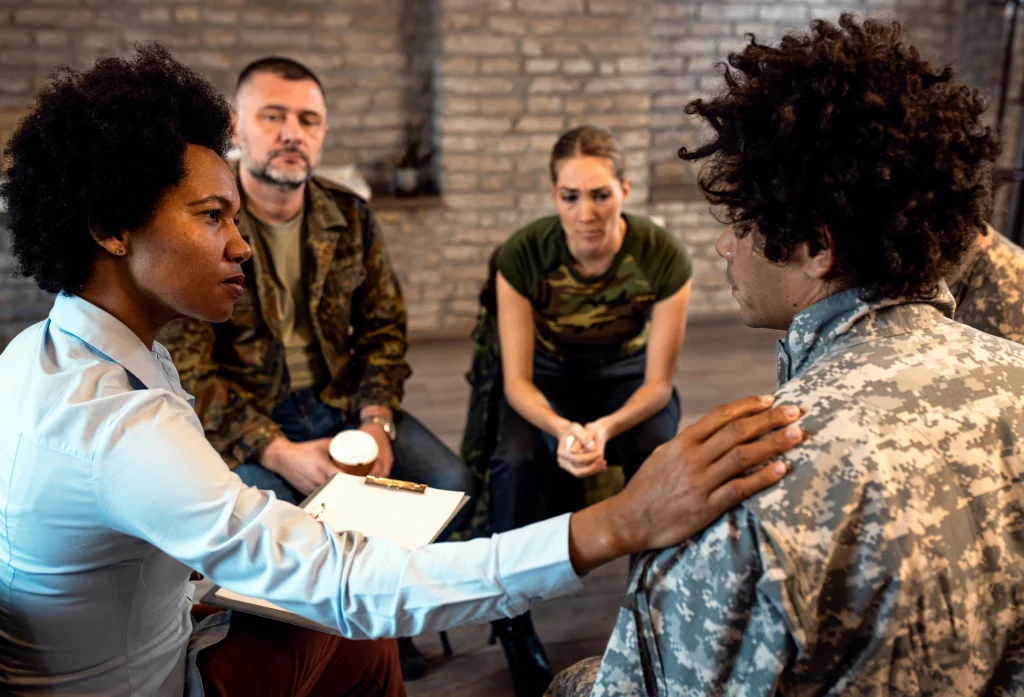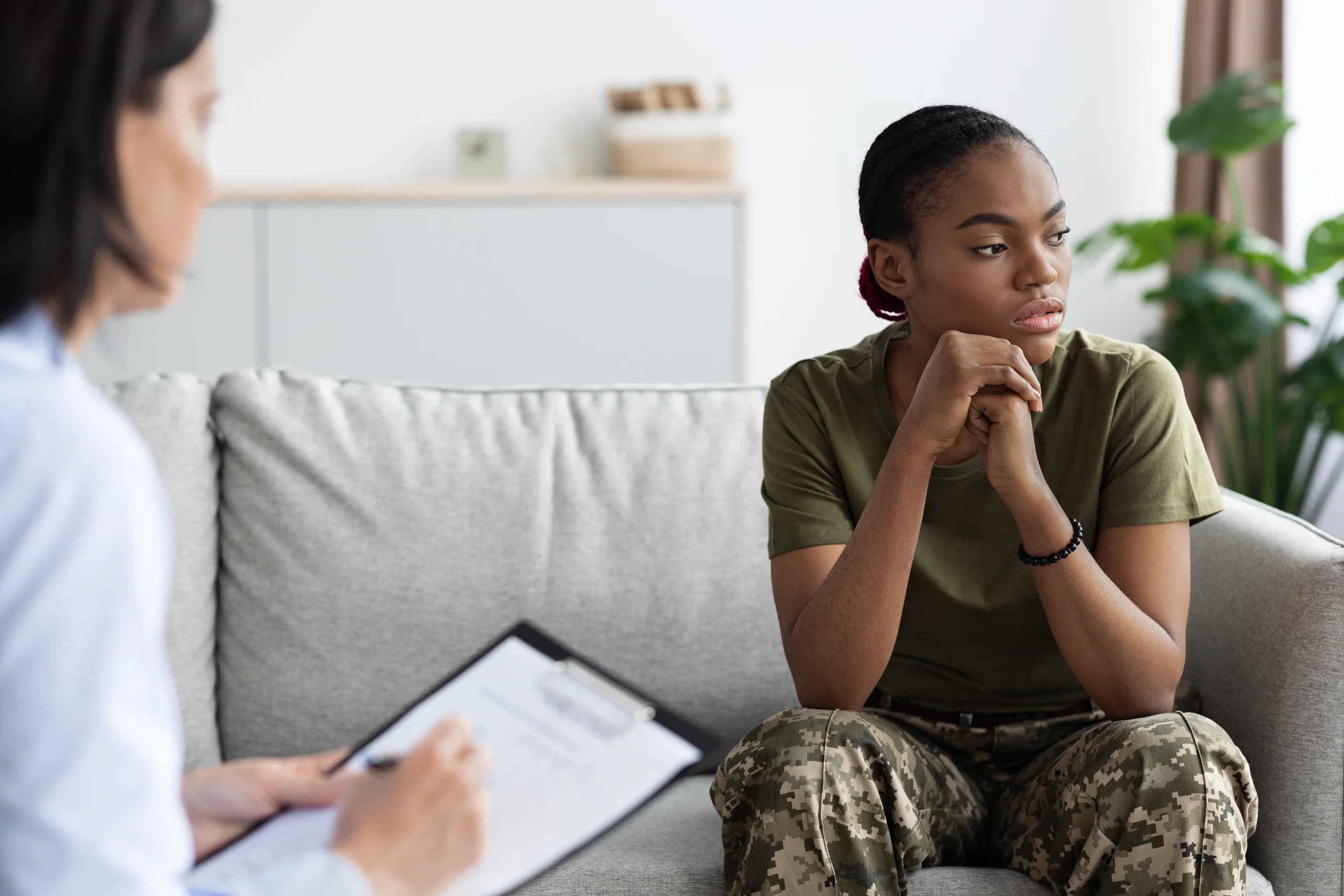Key Takeaways
Recent Posts
Categories
Can a Veteran With PTSD Own a Gun?
Key Takeaways
Veterans, Firearms, and the VA - Explained
"A well regulated Militia, being necessary to the security of a free State, the right of the people to keep and bear Arms, shall not be infringed."
As a pillar of the United States Constitution, the Second Amendment puts to words the conviction that an armed citizenry is the best safeguard against tyranny. America’s founding fathers learned from generations past that when the collective might of a nation rests solely in the hands of the few, democracy is unsustainable. The Constitution enshrines in law the inherent right of every American to protect themselves, their loved ones, and their way of life.
Veterans, having witnessed firsthand the cost of freedom and the realities of conflict, exemplify the spirit of responsible gun ownership. They hold the constitutional right to bear arms close to their hearts, understanding more than anyone the power a gun holds as both an instrument of destruction and a symbol of duty.
The Connection Between Veterans and PTSD: Addressing the Stigma
Serving in the military requires immense courage, resilience, and sacrifice. Yet, when the battles are fought and the uniforms hung in the closet, returning veterans often find themselves facing yet another enemy - post-traumatic stress disorder (PTSD). Millions of combat veterans have dealt with the invisible scars of PTSD, struggling with decades of nightmares, guilt, flashbacks, and outbursts of anger that affect their relationships and wellbeing.
Unfortunately, the societal stigma surrounding veterans and mental health can compound these challenges and create additional barriers to support. Misconceptions often cloud the conversation about veterans, PTSD, and firearm ownership. It’s important to note that the goal of this article is not to stigmatize or discriminate against veterans with PTSD, but to strike a balance between individual rights and public safety.
Key Statistics: Veterans, PTSD, and Firearm Ownership
The connection between veterans, PTSD, and gun ownership is clear, with a variety of compelling statistics that highlight the significance of this issue:
Approximately 11-20% of veterans who served in Operations Iraqi Freedom and Enduring Freedom experience PTSD in a given year.
About one-third of veterans seeking care for PTSD through the VA also own firearms.
Veterans with PTSD are more likely to have firearm-related concerns, including feeling less in control of their anger and having more thoughts of self-harm or harming others.
Studies indicate a correlation between PTSD and substance abuse among veterans, further complicating mental health challenges and creating dangerous implications for safe firearm ownership.
Veterans with PTSD who own firearms are more likely to die by suicide compared to those who do not own firearms.
It’s important to note that while veterans experiencing PTSD may face challenges related to firearm ownership, the vast majority of veterans with mental health conditions, including PTSD, do not pose a threat to themselves or others.
PTSD Symptoms That Can Affect Firearm Safety
It's crucial to recognize that certain PTSD symptoms can impact an individual’s ability to safely handle firearms. By understanding these symptoms and taking appropriate precautions, veterans can mitigate potential risks. Here are some common PTSD symptoms that may affect firearm safety:
Hyperarousal - PTSD can cause a constant state of heightened alertness, leading to increased reactivity, difficulty relaxing, and being easily startled. These symptoms can make it challenging to maintain composure and clear judgment while handling firearms.
Intrusive Thoughts or Memories - veterans with PTSD may experience intrusive thoughts or distressing memories related to their traumatic experiences. These intrusive thoughts can be invasive, overwhelming, and disruptive, potentially impairing concentration and focus during firearm use.
Flashbacks - PTSD can trigger vivid flashbacks where veterans feel as if they are reliving traumatic events. During a flashback, their perception of reality becomes distorted, making it challenging to handle firearms safely and make sound decisions in the present moment.
Emotional Numbing - PTSD can lead to emotional numbing, where veterans feel disconnected from their emotions and exhibit reduced responsiveness to external stimuli. This emotional detachment can hinder their ability to assess potentially dangerous situations accurately and make appropriate decisions while handling firearms.
Avoidance - veterans with PTSD often engage in avoidance behaviors to evade reminders of their traumatic experiences. Avoidance can include avoiding situations or places that trigger distressing memories. However, avoiding situations related to firearms or neglecting proper training and maintenance can undermine firearm safety.
While it’s important to acknowledge the challenges that PTSD symptoms pose to firearm safety, it’s equally crucial to maintain a balanced perspective. Dr. Casey Taft, principal investigator at the National Center for PTSD, VA Boston Healthcare System, states, “It’s a complicated relationship. Risk for violence is increased with PTSD, but most of those with PTSD are not violent. The notion that one can’t recover from PTSD and function at a high level has been shown to be false.”
It’s essential to understand that violence is not an inevitable outcome of PTSD. With proper support, treatment, and responsible firearm use, individuals with PTSD can lead fulfilling lives and thrive in society.
Strategies for Veterans with PTSD to Safely Manage Firearms
For veterans with PTSD who choose to own firearms, implementing the strategies laid out below can help ensure safety and responsible firearm handling:
Education and Training -seek comprehensive firearm safety training that specifically addresses the challenges associated with PTSD. Understanding safe handling practices, maintaining situational awareness, and learning strategies to manage triggers can help mitigate risks.
Collaborative Decision-Making - engage in open and honest discussions with mental health professionals, trusted friends, and family members regarding firearm ownership. Considering their input can help you make informed decisions that prioritize personal safety and well-being.
Secure Storage - safely store firearms in a manner that prevents unauthorized access, especially during periods of heightened symptoms or emotional distress. Utilize locked gun safes, trigger locks, or separate storage of ammunition to reduce the risk of an impulsive action.
Support Networks - cultivate a strong support network that includes mental health professionals, peer support groups, and loved ones who can provide assistance, guidance, and intervention when needed. Open communication within these networks can contribute to early intervention and reduce the likelihood of potential crises.
Regular Self-Assessment - continuously assess your mental health and the impact of PTSD symptoms on your well-being. Be mindful of any changes in symptom severity or the emergence of new triggers, and take proactive steps to address these challenges promptly.
Crisis Planning - develop a crisis plan in collaboration with mental health professionals. This plan should outline steps to follow during moments of intense distress or emotional turmoil. Having a predetermined plan can help mitigate risks and ensure access to timely support.

The VA's Stance on Veteran PTSD and Firearm Restrictions
The VA recognizes the importance of balancing veterans' rights with public safety concerns, encouraging open discussions about firearm safety and providing resources to veterans to ensure responsible ownership. The VA does not have the authority to restrict firearm ownership based solely on a PTSD diagnosis. However, the VA is committed to both assisting veterans in managing their mental health and making informed decisions regarding firearms.
Balancing Safety and Constitutional Rights: PTSD and Firearms
Accurate diagnosis is essential for providing appropriate care and support, and the VA plays a crucial role in diagnosing and treating PTSD among veterans, developing comprehensive treatment plans that address their needs. The VA will never restrict a veteran's gun rights solely based on a PTSD diagnosis or disability rating. The focus of the VA is primarily on providing healthcare and support services to veterans - not imposing restrictions on firearm ownership. It is crucial for veterans to understand that a PTSD diagnosis alone does not automatically disqualify them from owning firearms, and that overall, it's unlikely that a veteran diagnosed with PTSD will lose gun rights
The VA's Role in PTSD Diagnosis: Implications for Veterans and Gun Ownership
It’s vital to take note that there are certain circumstances in which the VA may report a veteran to the National Instant Criminal Background Check System (NICS), according to the Brady Act. This only occurs when the VA appoints a fiduciary for a veteran whose severe mental health symptoms leave them unable to manage their own financial affairs. In this case, an individual may lose their ability to own a gun. The reporting to NICS is intended to prevent individuals who are deemed mentally unfit to handle their finances from purchasing firearms, with the goal of ensuring public safety. This is not designed to unfairly target veterans with PTSD but rather to ensure that individuals who may pose a risk to themselves or others receive the necessary support and protection.
It is important to note that this process allows for individual circumstances and considerations to be taken into account. The VA’s resort to NICS can be appealed, and veterans have the opportunity to request relief at any time from the reporting requirements of the Brady Act, preserving their gun ownership rights. Veterans should always stay informed about their rights, consult legal experts if needed, and be proactive in advocating for themselves if they believe their circumstances warrant an appeal or request for relief.
PTSD Treatment Options for Veterans: Can They Affect Gun Ownership?
There are a wide variety of evidence-based treatment options available for veterans with PTSD, including therapy, medication, and complementary and alternative approaches. Engaging in treatment can significantly improve symptoms, enhance overall functioning, and support veterans in maintaining their quality of life. Seeking appropriate support, adhering to treatment plans, and actively managing their mental health can both contribute to responsible firearm ownership and enhance overall well-being.
If you’re concerned with pursuing treatment and losing your access to firearms, know that the process for restricting firearm ownership involves far more than just a PTSD diagnosis. In the United States, gun ownership is regulated by a combination of federal and state laws, and decisions regarding firearm possession are typically made based on specific circumstances and factors related to an individual's mental health and behavior.

Social Security Benefits for Veterans Diagnosed with PTSD
Veterans diagnosed with PTSD may be eligible for Social Security Disability Insurance (SSDI) or Supplemental Security Income (SSI) benefits. However, it's important to note that receiving these benefits does not impact a veteran's right to own firearms. The eligibility for and receipt of Social Security benefits are separate from the regulations surrounding firearm ownership.
The Role of the Disabled American Veterans (DAV): Encouraging Veterans to Seek Help Without Losing Their Rights
Organizations like the Disabled American Veterans (DAV) play a vital role in supporting veterans with PTSD. They provide resources, assistance, and advocacy to ensure veterans can access the care they need while preserving their rights. The DAV works to combat the stigma surrounding mental health issues, encourages veterans to seek help, and promotes responsible firearm ownership through education and awareness campaigns.
Veterans, PTSD, and the Second Amendment: Looking Toward the Future
Recognizing the unique challenges faced by veterans with PTSD while respecting their constitutional rights is crucial. Striking a balance between supporting mental health needs and preserving the Second Amendment rights of veterans requires ongoing dialogue, collaboration, and awareness. This dialogue is becoming increasingly critical, as evidenced by recent incidents like 2023’s tragic mass shooting in Atlanta, where a U.S. Coast Guard veteran diagnosed with PTSD opened fire in a medical waiting room, killing one and injuring four others.
Simultaneously, recent steps have been made to intensify gun control legislation. In 2023, President Biden signed an expansive executive order on gun control, aimed at expanding background checks, promoting safe storage of firearms, and preventing firearms dealers with revoked federal licenses from continuing to sell guns. This order also directed federal agencies to increase transparency on firearms dealers who have violated federal laws and provide mental health care, financial assistance, and food to communities impacted by mass shootings.
By fostering a culture that encourages help-seeking, providing effective treatment options, and promoting responsible firearm ownership, we can empower veterans with PTSD to lead fulfilling lives while prioritizing both their Second Amendment rights and the safety of themselves and their communities. These efforts will require both an ongoing commitment to mental health support for veterans and a culture of reasonable compromise where gun control is concerned.
Frequently Asked Questions
No, the VA does not have the authority to confiscate a veteran's guns solely based on a PTSD diagnosis. The VA's role primarily revolves around providing healthcare and support services to veterans, rather than imposing restrictions on firearm ownership. The decision to restrict or revoke firearm ownership rights is typically determined by state and federal laws, as well as the legal system. It is important to consult local laws and regulations for specific guidance regarding firearm ownership.
The eligibility for a concealed carry permit varies from state to state, and it is subject to the applicable laws and regulations of the specific jurisdiction. While a PTSD diagnosis alone does not automatically disqualify a veteran from obtaining a concealed carry permit, some states may inquire about a mental disorder as part of the permit application process. It is important for veterans with PTSD to familiarize themselves with the laws and requirements of their state regarding concealed carry permits.
Recent gun legislation can vary across jurisdictions and may have different implications for veterans with PTSD. Changes in legislation can impact aspects such as background checks, reporting requirements, and restrictions on firearm ownership for individuals with mental health conditions. It is crucial for veterans to stay informed about any updates or changes in gun legislation specific to their location and to consult legal experts or authorities for guidance regarding their rights and responsibilities as firearm owners.
The ability of a veteran with a PTSD diagnosis to purchase a gun depends on various factors, including applicable state and federal laws, as well as any restrictions imposed by the legal system. In general, having a PTSD diagnosis alone does not automatically disqualify someone from purchasing a firearm. However, individuals with certain mental health conditions may be subject to additional scrutiny during the background check process. It is important for veterans to be aware of the specific laws and regulations in their jurisdiction and to comply with the applicable requirements when seeking to purchase a gun.
During a PTSD attack, it is important to prioritize your safety and well-being. Here are some strategies that may help:
- Practice deep breathing and grounding techniques to help manage anxiety and regain a sense of control.
- Engage in self-care activities that promote relaxation and stress reduction, such as taking a warm bath, listening to calming music, or engaging in hobbies you enjoy.
- Reach out to a trusted support system, such as a friend, family member, or mental health professional, who can provide assistance and understanding.
- Consider developing a safety plan in collaboration with your healthcare provider to identify strategies and resources to utilize during challenging moments.
- Explore therapy options, such as cognitive-behavioral therapy (CBT) or eye movement desensitization and reprocessing (EMDR), which can help address and manage PTSD symptoms.
If your symptoms escalate or you feel unsafe, contact emergency services or a crisis hotline for immediate assistance. It is important to work closely with a mental health professional who can provide personalized guidance and support tailored to your specific needs and circumstances.
YOU DON’T HAVE TO DO THIS ALONE
CONTACT VA DISABILITY LAWYERS
To learn more about our law firm, our services, how to access our veterans law resources, and more, contact us today.
You get a free consultation and we won’t charge you a dime until we’ve won your case.


